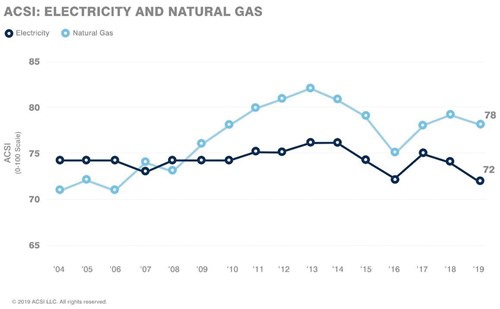May 2019 Vol. 74 No. 5
Newsline
Customer Satisfaction Declines Across Energy Utilities Sector
Following a slight bump in 2018, residential customer satisfaction in the energy utilities sector has taken an about-face one year later.
While U.S. natural gas production is at an all-time high and electricity generation from renewable sources is growing at a record rate, customer satisfaction with gas and electric service providers fell 2.7 percent to a score of 73.2, on a scale of 0 to 100, according to the American Customer Satisfaction Index (ACSI) Energy Utilities Report 2018–2019.
“Higher prices and extreme weather are the biggest culprits behind this sector-wide drop in customer satisfaction,” said David VanAmburg, managing director at the ACSI. “Customers are also upset with the decline in electric power reliability. The energy utilities sector needs to take a hard look in the mirror, as the pressure mounts to upgrade and strengthen the grid.”
Natural gas is losing ground this year, yet remains the preferred energy source for households, with an ACSI score of 78. Electric power can’t keep up and trails with a mark of 72.
The ACSI results comprise three categories of energy utilities: investor-owned, municipal and cooperative. Despite tumbling 2.6 percent to an ACSI score of 75, cooperative utilities hold the highest customer satisfaction among the three groups. Investor-owned utilities and municipal utilities suffered an even greater drop-off, each plummeting 2.7 percent to tie at 73.
This year, nearly every investor-owned utility company is experiencing a year-over-year drop in customer satisfaction, but CenterPoint Energy, even with a 2-percent decline, remains at the top of the category. The Houston-based utility gained 77,000 new gas and electric utility customers in 2018 and finished with an ACSI score of 80.
NextEra Energy is one of the few companies to experience an increase in customer satisfaction, inching up 1 percent to 77. WEC Energy, Excel Energy,
and Exelon also rose 1 percent to 76, 74 and 73, respectively.
Despite challenges from the wildfires that took place during ACSI data collection, PG&E remained stable year-over-year with a score of 70. The California utility filed for Chapter 11 bankruptcy after these customer interviews took place.
Investor-owned utilities are weaker in all aspects of the customer experience this year. The lowest-scoring aspects of utilities revolve around perceptions of good will, as efforts to support the local community (70) and green programs (70) fall short of expectations.
The customer experience benchmarks sank nearly across the board. Customers are especially disappointed in the lack of energy-saving ideas (71) and support for green initiatives (70). In terms of electric service reliability, however, municipal utilities (85) outrank both investor-owned (80) and cooperative utilities (83).
Smaller, rural cooperatives experienced a 1 percent uptick in customer satisfaction to an ACSI score of 77. This marks a third, straight year of improvement for these cooperatives.
Member-owned cooperatives also outperform the other groups in restoring electric service following an outage (81).
ACSI has been an annual, national economic indicator for 25 years. It measures and analyzes customer satisfaction with more than 400 companies in
46 industries and 10 economic sectors, including various services of federal and local government agencies.
Results of the Energy Utilities Report 2018–2019 are based on interviews with 21,646 residential customers, chosen at random and contacted via email between Jan. 16 and Dec. 25, 2018. Customers were asked to evaluate their recent experiences with the largest energy utilities in terms of market share,
plus an aggregate category consisting of “all other”—and thus smaller—companies. •
FOR MORE INFORMATION
American Customer Satisfaction Index, (734) 913-0788, theacsi.org





Comments